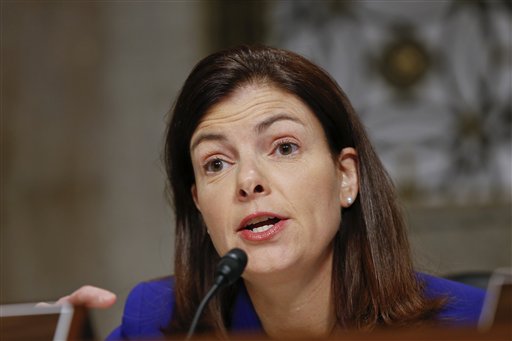BOSCAWEN, N.H. — U.S. Sen. Kelly Ayotte has endured sustained and sharp political attacks on New Hampshire television for voting with her Republican Party and against universal background checks on gun purchases, and Republicans close to the first-term lawmaker acknowledge that her popularity has suffered.
But there’s more to it than that. The gun vote says a lot about the image she’s carved out since taking office in 2011.
Ayotte quickly has become one of the party’s most loyal senators, supporting GOP leaders far more frequently than do fellow Republicans in the Northeast. That’s politically dangerous in New Hampshire, where independents and Democrats hold considerable sway.
Overall, Ayotte supported her party at least 86 percent of the time since coming to Capitol Hill, according to an analysis by the nonpartisan group OpenCongress.
In a party eager to find fresh faces, such loyalty brings a high-profile role.
The former New Hampshire attorney general was an important surrogate for Mitt Romney’s presidential campaign last year and has become a leading GOP voice on national security.
U.S. Lindsey Graham, R-S.C., describes the 44-year-old mother of two young children as a rising star for an evolving Republican Party long dominated by older “white guys.” She is one of just four Republican women in the Senate and the youngest of the group by more than a decade.
“It’s amazing to me after just a few years what an impact player she’s become,” Graham said.
Ayotte’s visibility, like her early voting record, carries risks.
Critics suggest she is following the footsteps of at New Hampshire’s last Republican senator, John E. Sununu, who was once thought to be a climber among Republicans in the nation’s capital, but lost his first re-election. Ayotte’s supporters note that while her once sky-high popularity has suffered, polls suggest that more New Hampshire voters still see her favorably than not.
Ayotte declined to be interviewed for this story.
Her supporters note that most Democrat senators across the Northeast have higher party-loyalty ratings than Ayotte does. Indeed, her New Hampshire colleague Jeanne Shaheen, a Democrat up for re-election next year, votes with her party more than 90 percent of the time.
But the stakes may be higher for Ayotte, who faces re-election in 2016, in a region where Republicans are nearly extinct. Ayotte is one of just two congressional Republicans across all six New England states. The other, Maine Sen. Susan Collins, is widely considered more moderate and voted with her leadership just 65 percent of the time, according to OpenCongress.
The frequency of Collins’ willingness to vote against her party is in line with former Republican Sens. Olympia Snowe, of Maine, and Scott Brown, of Massachusetts. Snowe retired last year, while Brown was defeated.
“Kelly Ayotte is representing around 10 percent of voters who are the extreme right wing of her base,” Democratic National Committee spokesman Michael Czin said. “I don’t think it will serve her well in the short term or the long term.”
Despite her early record, colleagues say Ayotte is willing to reach across the aisle. Ayotte joined with Democrats during last week’s congressional hearings about sexual assault in the military.
“What you’re going to find in Kelly is a conservative who is very practical and pragmatic,” said Graham, who described Ayotte as the “third amigo” in his friendship with Arizona Sen. John McCain. “She’s by no means an ideologue.”
Ayotte has embraced a high-profile role on some contentious issues. Most notably, she has become a leading voice in the GOP’s campaign to investigate the Obama administration’s actions in Libya, where the American ambassador and three others were killed in Benghazi last fall.
Like many of her party’s more conservative members, she has yet to endorse the immigration legislation, crafted by Florida Sen. Marco Rubio and a small bipartisan group of senators, that allows a path to citizenship for immigrants who entered the country illegally. She has resisted joining Democrats and a few Republicans who are calling for tighter gun laws following the December school massacre in Connecticut.
Ayotte’s mid-April vote against expanded background checks for gun purchases at gun shows and on the Internet in particular triggered a flood of criticism. Polls suggest the proposal was overwhelmingly popular among voters in New Hampshire and nationwide. Four other Republican senators — including Collins, McCain, Illinois’ Mark Kirk and Pennsylvania’s Pat Toomey — voted for the plan, which fell short of the 60 votes needed to advance.
Mayors Against Illegal Guns, a group backed by New York’s mayor, billionaire Michael Bloomberg, has spent $1.8 million so far pummeling Ayotte with statewide television ads since early May. Rubio came to her defense, using his political action committee to fund a television ad campaign praising Ayotte’s support for a substitute gun provision focused on mental health. But Bloomberg’s group has outspent Rubio’s and released a new television ad, its fourth since early May, that targeted Ayotte as recently as last week.
“Our hope is that she looks at this issue and reconsiders, and recognizes that what people are really looking for is bipartisan leadership,” said Howard Wolfson, Bloomberg’s deputy mayor and a strategist for the group. “We’re not going away. We’re going to continue to press the issue.”
Ayotte’s aides say she’s unlikely to change her vote if background checks come up again in the Senate. They say there’s plenty of time to recover any lost political capital before her next election, which is more than three years away.
But the impact of the ad campaign was evident at a recent Memorial Day celebration, even among veterans who supported Ayotte in 2010.
“She was the only one in the Northeast to vote against it,” said World War II veteran Earl Isham, of Bedford, N.H., a Republican and fierce critic of President Barack Obama. “Her vote tells me she was voting with them and not her state.”
Send questions/comments to the editors.


